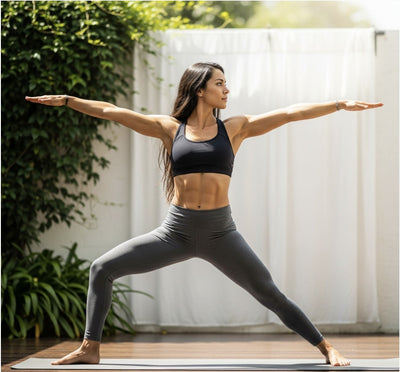
The Role of Discrimination and Inquiry in Jnana Yoga - 5To9Style
Share
The Role of Discrimination and Inquiry in Jnana Yoga
Understanding Jnana Yoga: The Path of Wisdom
Jnana Yoga, often referred to as the "Yoga of Wisdom" or "Yoga of Knowledge," is one of the four classical paths of yoga, alongside Bhakti Yoga (devotion), Karma Yoga (action), and Raja Yoga (meditation). While all paths ultimately lead to the same destination – self-realization and union with the Divine – Jnana Yoga takes a direct, intellectual, and philosophical approach. It's not about physical postures (though a disciplined body can aid a disciplined mind), but rather about rigorous self-inquiry and the profound understanding of one's true nature.
At its core, Jnana Yoga seeks to answer fundamental questions: Who am I? What is reality? What is the nature of existence? To unravel these mysteries, two powerful tools are employed: discrimination (Viveka) and inquiry (Vichara). These are not mere intellectual exercises but deep, transformative practices that dismantle illusions and reveal the unshakeable truth.

The Power of Discrimination (Viveka)
Viveka is the ability to discern, distinguish, and differentiate between the real and the unreal, the permanent and the impermanent, the self and the non-self. In the context of Jnana Yoga, this isn't about judging right or wrong in a moral sense, but rather about seeing through the layers of illusion (Maya) that obscure ultimate reality.

Think about our daily lives. We often identify with our bodies, our emotions, our thought, our roles, and our possessions. Viveka helps us to systematically analyze these identifications and realize that they are temporary, changing, and ultimately not our true, unchanging Self (Atman). For instance, when you feel angry, Viveka prompts you to ask: "Is this anger me, or is it merely an emotion passing through me?" By consistently practicing this discernment, we begin to detach from the fleeting aspects of our experience and connect with the eternal, unchanging essence within.
This process can be profound, and it requires a sharp, trained mind. Just as choosing the right yoga mat can enhance your physical practice, developing Viveka enhances your mental clarity. It's about recognizing that what is perceived through the senses or understood by the intellect is not the ultimate truth. The true Self is beyond all attributes and limitations.
The Art of Inquiry (Vichara)
While Viveka helps us to separate truth from untruth, Vichara is the active process of deep, sustained self-inquiry. It is the relentless questioning and contemplation that drives us to investigate the nature of our existence. This is not casual questioning but a focused, intense introspection that penetrates the superficial layers of consciousness.

The most fundamental question in Vichara is "Who am I?" This seemingly simple question opens up an entire universe of exploration. When you ask this, you're not looking for your name, profession, or relationships. You're delving deeper, beyond the ego, beyond the mind, to find the source of consciousness itself.
Vichara involves:
- Contemplation: Meditating on philosophical truths and scriptures.
- Self-Observation: Witnessing your thoughts, emotions, and actions without judgment.
- Analysis: Breaking down concepts and experiences to understand their underlying reality.
- Negation (Neti Neti): This powerful technique, meaning "not this, not this," involves systematically negating everything you are not – not the body, not the mind, not the emotions – until only the true Self remains.
Through Vichara, the intellectual understanding gained from Viveka is transformed into direct experience. It's the difference between reading a recipe and actually baking the cake. This rigorous mental discipline is a form of yoga practice in itself, honing your cognitive abilities to pierce through ignorance.
Integrating Discrimination and Inquiry into Your Practice
For those drawn to the path of Jnana Yoga, integrating Viveka and Vichara into daily life is crucial. This isn't something reserved for meditation cushions; it's a constant state of mindful awareness.
- Mindful Living: Pay attention to your reactions, thoughts, and feelings throughout the day. Ask yourself: "Is this real or a projection?" "Am I identifying with something temporary?"
- Study Sacred Texts: Engage with texts like the Upanishads, Bhagavad Gita, and the works of Advaita Vedanta masters. These texts provide frameworks for Viveka and fuel your Vichara.
- Meditation: Use meditation to quiet the mind and create space for deep inquiry. When the mental chatter subsides, the answers often arise from within.
- Practice Self-Awareness: Just as you might choose comfortable and flexible yoga wear to facilitate your physical practice, cultivate mental flexibility and openness to truly engage in self-inquiry.
 The journey of Jnana Yoga, powered by Viveka and Vichara, is transformative. It's a path for the courageous, for those willing to question everything they thought they knew, and for those who seek the ultimate freedom that comes from knowing their true, unchanging Self.
The journey of Jnana Yoga, powered by Viveka and Vichara, is transformative. It's a path for the courageous, for those willing to question everything they thought they knew, and for those who seek the ultimate freedom that comes from knowing their true, unchanging Self.
Embrace Your Path to Wisdom
Whether you are deeply immersed in philosophical inquiry or simply seeking to bring more mindfulness into your daily life, the principles of discrimination and inquiry can profoundly enrich your journey. For tools and resources that support a holistic approach to wellbeing and self-discovery, including comfortable yoga attire and accessories, explore our full collection at 5to9style.com/collections/all
Begin your exploration today and cultivate a deeper connection to your true self. Visit our homepage for more insights and to discover products that align with your mindful lifestyle: 5to9style.com








